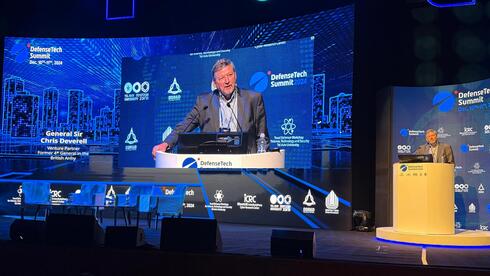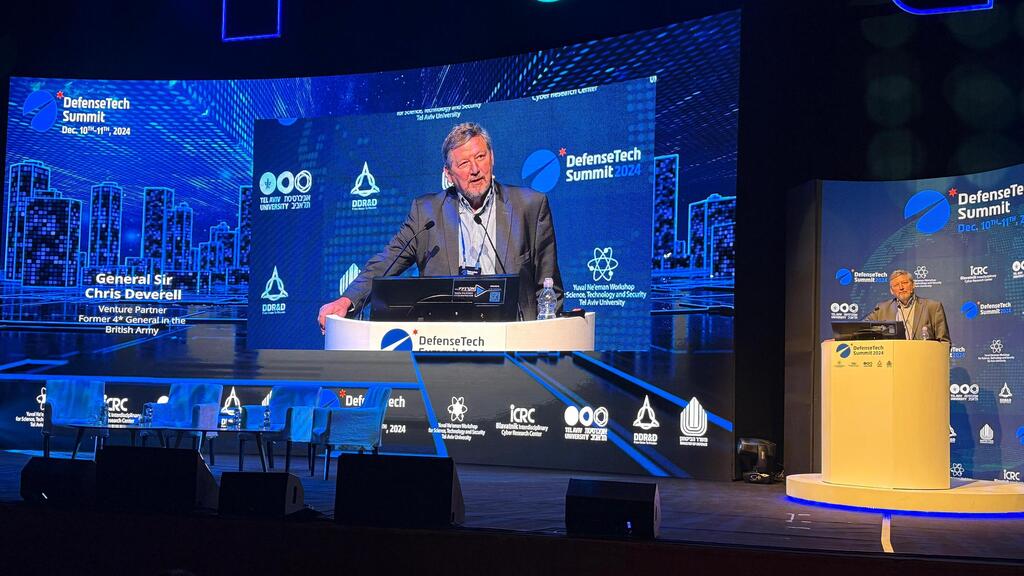
"There is no reason why the benefits of the VC and startup model cannot occur in defense"
The remarks were made by Sir Chris Deverell, a former 4* General in the British Army and Venture Partner, during the 2024 DefenseTech Summit in Tel Aviv.
States and their Defense Departments should look at the nimble startup sectors to navigate around the “slow-moving, risk-averse” administrative approach to keep up with the modern demands of war, according to Sir Chris Deverell, a former 4* General in the British Army and Venture Partner, during the 2024 DefenseTech Summit in Tel Aviv. Making his remarks in a talk titled ‘New Defense’, he shared how he spent 40 years as a soldier but now is focused on helping the battlegrounds through technology and innovation.
“The first part of New Defense is developing the ability to manufacture on a much greater scale if need be, and faster,” he told the crowd. “This won't happen by accident, quite the reverse. Our experience over the last five decades is that this is precisely what will not happen unless we plan for it and, to some degree, contract for resilience.”
Sir Deverell was speaking largely from experience when he noted how in the past militaries would “seek the exquisite” in their technologies, often meaning they would spend far more money on far fewer tanks or major platforms in the hopes they would remain relevant decades into the future. “You must be able to mass produce capabilities quickly in times of conflict, and we just ignored that, I forgot about it, or it was too difficult,” he confessed. “If you lean forward to today, you're obviously seeing conflicts in Ukraine, which is consuming vast amounts of equivalent and ammunition.”
It is this lifecycle challenge that has confirmed to Sir Deverell that armies around the world should look to the startup system in order to adopt a software-first approach and help with the increased demand. “We need to think about what factories we must have and how we increase our rate of production in times of crisis… Now, if we're smart about how we think about technology, this doesn't have to mean keeping hugely expensive production lines open if we take a software-first approach... People tend to think of software and hardware as different things. And I think they are certainly not so now if indeed they ever were.”
Today as a Venture Partner in Deverell Innovation Ventures and advisor to various startups with an interest in defense or security, Sir Deverell is pursuing a portfolio career focussed around innovation, strategy, and leadership. He spoke at Tel Aviv’s first DefnseTech Summit which invited investors, government members, CISOs, and founders to explore how technology can be used to make the world a safer place.
For Sir Deverell, this means looking at startups as a way to help the defense sectors catch up with the rest of the world. “I think that model is right for disruption. In the same way that the disruption has occurred in lots of other sectors as a result of the digital revolution, there is no fundamental reason why the benefits of the venture capital and startup model cannot occur in defense as in other sectors.”
The DefenseTech sector has seen an incredible boom in recent months given the ongoing conflicts around the world. In Israel, a country that has always had to balance war with growth, the cycle of soldiers leaving their posts in the army to found private tech companies has become a healthy - albeit necessary - step in the economy.
“We need to take advantage of the place where the economic incentives for talent are strongest, which is largely the world of startups,” he concluded.
”The startup world secures capital from venture capital…
In turn, startups take that capital and use it amongst other ways to buy talent. In my experience, this means that the talent they acquire is many leagues more capable than that available in the Ministry of Defense. So this world of venture capitalism startups has to be another part of new defense.”
Sir Deverell concluded by reiterating how New Defense needs to be nimble, resilient, and ready to take on new challenges for a new era of war. NATO has increased its spending by 11% in real terms and areas like the European Investment Funds have created large pools of capital to invest in DefenseTech. “It's happening. It's not going to be easy, change never is, but I think if we don't collectively adopt new defenders, we will be in deep trouble,” he concluded.















